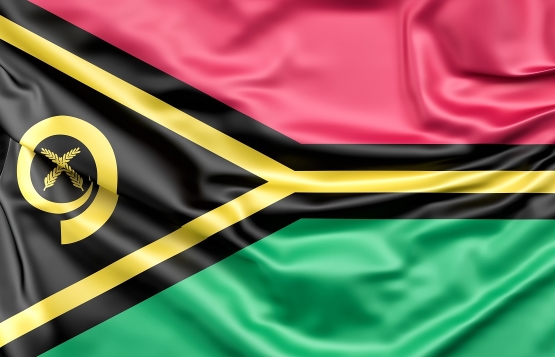
The Citizenship by Investment Programme
Some information about Vanuatu
The Republic of Vanuatu is an island country in Melanesia, South Pacific. Its neighbours include the Solomon Islands to the north, Australia to the west, New Caledonia to the southwest and Fiji to the east. It has 2,528 km of coastline, a total surface area of 12,190 square km, and a population of about 276,000 (2017). The nation’s capital is Port Vila.
Vanuatu occupies 83 islands of the New Hebrides archipelago in the volcanic belt of the Pacific Ocean where the Australian and Pacific tectonic plates meet. This causes frequent volcanic activity and earthquakes, although both are usually mild and rarely destructive. Vanuatu’s best known active volcano is Mount Yasur on Tanna Island (365 m above sea level). The country’s two largest islands are Espiritu Santo (4,010 square km) and Malakula (2,069 square km). The first of the islands is home to Vanuatu’s highest peak – the dormant volcano Mount Tabwemasana (1877 m).
The nation’s official currency is the vatu (VUV). The Australian dollar is also widely circulated and accepted in most shops and restaurants. Vanuatu has three official languages – English, French and Bislama (an Englishbased creole language).
History
Espiritu Santo was the first Vanuatu island spotted by the Europeans. It was discovered in 1606 by a Spanish expedition led by Pedro Fernandes de Queirós who assumed that is was part of Terra Australis Incognita. No other European ship approached these shores until 1768, when the archipelago was rediscovered by the French explorer Louis Antoine de Bougainville. In 1774, Captain James Cook named the islands the New Hebrides, a name that would last until Vanuatu’s independence. In the 19th century, the islands’ population was reduced due to the locals being used as labourers on foreign plantations. In 1879, the Russian scientist Nicholas Miklouho-Maclay carried out his research on Efate Island, making notes and observations which later played a crucial role in the preservation of Vanuatu’s indigenous culture. Clashing French and British interests in the region raised the issue of ownership. In 1906, the islands became a Condominium jointly administered
by Great Britain and France. The nation’s current name, Vanuatu (literally: “this land forever”), was officially adopted on 30th July 1980 when the archipelago declared its independence from the British and French rule.
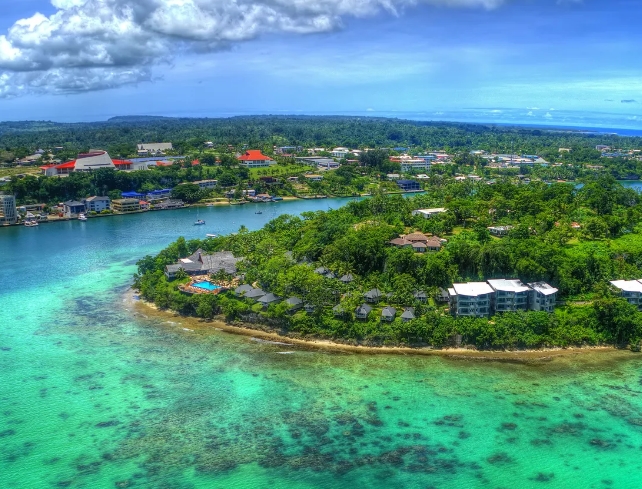
Tax Heaven
While this offshore jurisdiction isn’t particularly well known, many features make it both interesting and appealing. Within the Vanuatu jurisdiction, one can establish companies similar to the classic International Business Company format. Offshore companies in Vanuatu are exempt from capital and currency controls. Just like in other classic offshore jurisdictions, the company must maintain its accounts. Currently there is no requirement of submitting reports to the tax authorities. The main privilege available to offshore companies is a complete relief from taxation for 20 years. In addition, Vanuatu offers excellent terms for obtaining a Forex broker licence. The lost cost of registration and quick processing times have made it one of the most sought-after jurisdictions among Forex brokers. The nation strictly adheres to the Prevention of Fraud Act, which enables both individuals and companies to obtain a licence for dealing in securities.
Government Administration
Vanuatu is a sovereign unitary democratic republic. The nation’s Constitution, adopted on 30 July 1980, stipulates a republican form of government based on the Westminster parliamentary system. Vanuatu’s legal framework is rooted in English and French law.
The country’s legislative branch is represented by the unicameral Parliament which is empowered to issue laws by adopting draft bills suggested by the Ministers of Vanuatu. Once a draft bill is approved, it is forwarded to the President for review. The President, appointed by the Electoral College which consists of members of Parliament and the presidents of Regional Councils, is the formal head of state but has no real authority. Executive powers are wielded by the Prime Minister and the Council of Ministers. Vanuatu’s judiciary consists of the Court of Appeal, the Supreme Court, magistrate courts and island courts. In Vanuatu, indigenous customs still play an important part in the nation’s political life. In evidence of that, the National Council of Chiefs, called the Malvatu Mauri, is a constitutional authority. The Council is involved in discussing all matters associated with the nation’s customs and traditions. In addition, it consults the government on culture and language-related issues.
The Citizenship By Investment Programme
Citizenship Details
Vanuatu’s Citizenship by Investment scheme became law in 2017. Applicants are offered a single investment option – Development Support Programme
(DSP), which enables foreign investors to obtain honorary citizenship in return for a donation in the amount set by law.
The nation’s government has restructured its citizenship scheme to optimise the security screening process and reduce the volume of required paperwork. Vanuatu is a member state of the British Commonwealth, which grants its citizens visa-free entry to the UK for 180 days per year; moreover, an agreement with the EU and Schengen Area countries enables visa-free entry for 90 days every 6 months. Visas for the USA and Canada can be granted for a period of 10 years. On top of that, Vanuatu is an offshore financial hub in the Pacific. Vanuatu’s taxation system is extremely favourable, with identical terms for residents and non-residents. There are no taxes on income, wealth, inheritance, capital gains, corporations, capital withdrawal or stock exchange trading profits.
To qualify, applicants must meet the flowing requirements: lack of criminal record; good health; high net worth; ability to invest in the approved option.
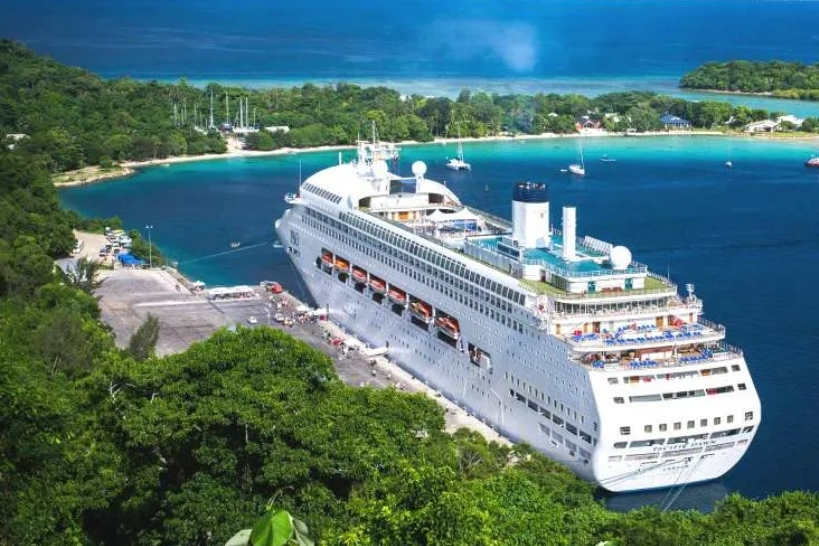
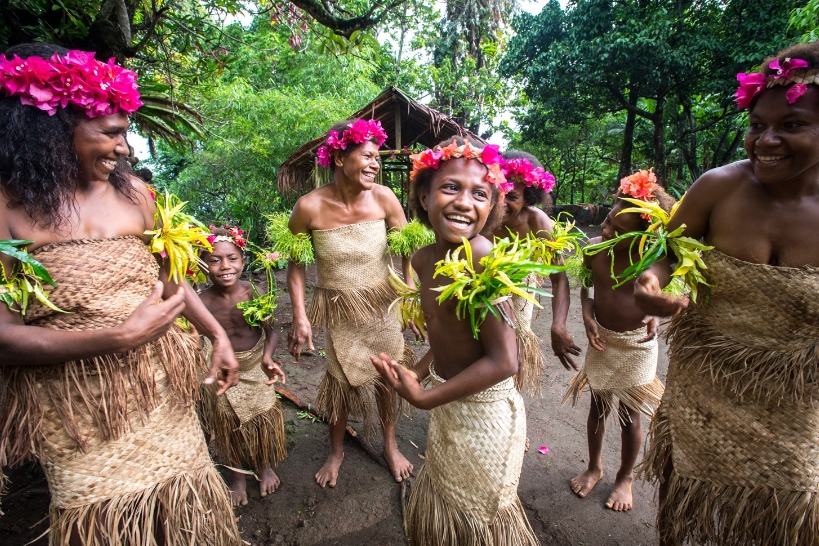
Specifics and benefits
Vanuatu citizenship and passport facts
Vanuatu citizenship benefits
By law, the Citizenship by Investment scheme in Vanuatu offers the following option:
Country Development
Economy
Vanuatu is a small and relatively poor nation. Despite the low income per capita, the nation came fourth in the 2016 Happy Planet Index. This is due to a clean environment, strong communities and peaceful coexistence of more than 100 ethnicities.
The country’s economic model is typical for the Pacific Region with its focus on agriculture, fishing and tourism. Vanuatu has a predominantly agricultural-based economy with 80% of the population employed in that sector. In addition to the vast coconut palm plantations, other popular crops are coffee and cocoa trees, taro, yam, cassava, various fruit and vegetables. Livestock farming includes cattle, pigs and sheep. Corpa, the dried meat of the coconut, is Vanuatu’s main export accounting for a 35% share of the nation’s total exports. Copra, cocoa, kava, palm oil, timber and beef comprise over 70% of Vanuatu’s exports in value terms and around 20% of the country’s GDP. Some of the goods produced in Vanuatu, mostly agricultural, are intended for export only.
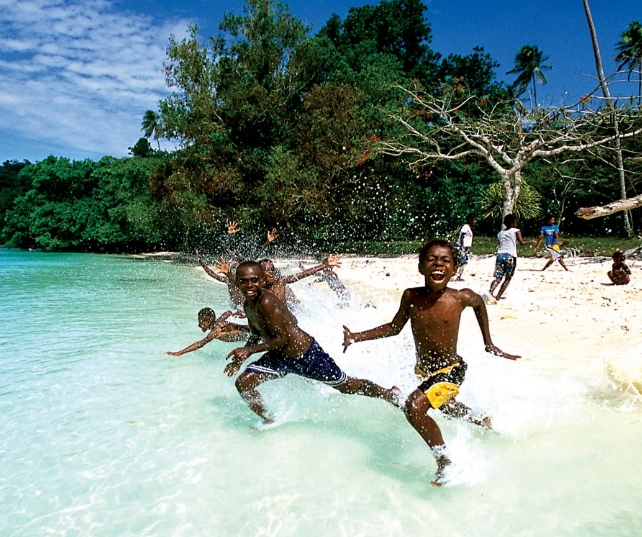
Vanuatu has an exclusive economic zone of 680,000 square km (260,000 square miles) and maritime resources. The fishing industry, bringing 25 million vatu in annual income to coastal settlements, provides the domestic market with 80 tons of fish per year; a small quantity is exported. There is farming of trochus snails for export and of aquarium fish (mostly on Efate Island).
The country’s budget is also replenished by issuing foreign vessels with fishing licences in the coastal economic zone. Japanese, Taiwanese and Korean ships have been fishing for tuna in Vanuatu’s waters since the mid-1950s. The country imports machinery and equipment, foodstuffs and fuel. Its main trading partners are Japan, Australia, Germany, Spain, Singapore, New Zealand, France and Fiji.
Tourism is the fastest developing sector of Vanuatu’s economy; in 2000, it accounted for 40% of the nation’s GDP. The main tourism hubs are Efate Island and its satellite small islands, as well as Espiritu Santo.
The most popular holiday choices in Vanuatu are diving, deep sea fishing, spa and wellness retreats, weddings and honeymoons. There are logging operations and active sawmills on the islands. In addition, Vanuatu produces foodstuffs and textiles. The local food industry specialises in frozen fish and agricultural produce, as well as meat preserves. Vanuatu’s consumer goods industry is mostly domestic market orientated. On Efate Island, there are manganese ore mining operations, while on Malakula and Espiritu Santo, diamonds, gold and silver are harvested since 1988.
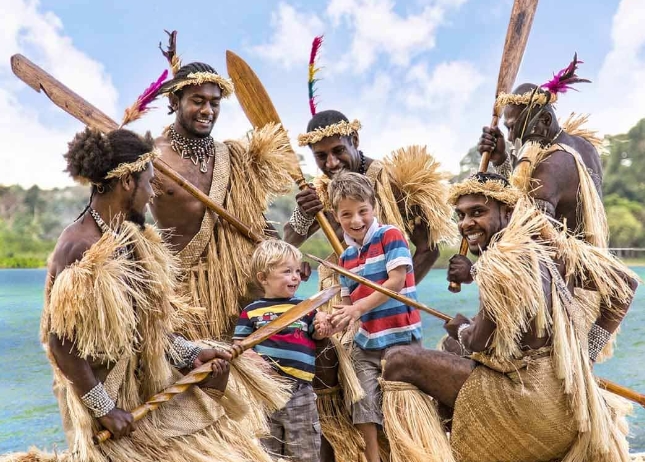
Vanuatu’s government is very actively involved in the development of the offshore financial sector and therefore, the attraction of foreign capital. In Vanuatu, on top of registering an offshore company, one can also purchase more complex financial products, such as a Vanuatu banking licence or a financial dealer licence.
Offshore companies in Vanuatu can be established as trusts, International, Exempted or Local Companies. The last option is suitable for entrepreneurs who wish to conduct their actual operations in Vanuatu. The country’s tax rules for non-resident and local companies are identical. International Business Companies (IBC) are exempt from any forms of taxation for the first 20 years. Vanuatu has a zero-rate corporation tax and income tax for intrepreneurs wishing a purchase an existing company on the archipelago. The VAT rate in Vanuatu is 12.5% alongside the zero-rate corporation tax. The country’s active orporate legislation consists of The Companies Act (Cap 191) or the International Companies Act No. 32 of 1992.
Business owners purchasing offshore companies in Vanuatu can enjoy multiple benefits, including:
– Accessible registration process. Registering a new company in Vanuatu takes as little as several weeks, while purchase of an existing company can be complete in a day.
– Personal data protection. Business owners enjoy guaranteed confidentiality. Only the company’s name and contact details are made public. The law protects the personal data of the shareholders and the director, and access to this information by third parties is strictly impossible. The information can only be disclosed if stipulated by a local court’s decision.
– Zero tax rate. One of the main reasons why offshore companies are so popular is zero taxation, which applies even to any income generated outside of the jurisdiction. Offshore companies in Vanuatu are exempt from corporation, income, and inheritance tax, taxes on capital withdrawal or stock exchange trading profits, and turnover tax.
– Favourable terms for non-residents. For trusts and banking organisations, various concessions are available, and levies on many operations are more than reasonable.
– Vanuatu has no currency controls.
– Companies which have just been registered in the country are exempt from stamp duty for 20 years.
– No regular reporting obligations. Similarly to most classic jurisdictions, business owners in Vanuatu must maintain their accounts, but there are no compulsory reporting or audit requirements. The only mandatory requirement is a registration office and a registration agent in Vanuatu.
Vanuatu can’t be described as a classic offshore zone since company registration incurs VAT (12.5%). The situation here is quite different: the government offers interesting and appealing terms for offshore banking, Vanuatu company registration and obtaining a banking licence.
Australia and New Zealand have both played a significant part in making Vanuatu an offshore region as transparent and attractive to investors as it is today.
The Republic of Vanuatu is a member state of the UN, the Commonwealth of Nations, the Francophonie, the Secretariat of the Pacific Community, the South Pacific Commission, as well as African, Caribbean, and Pacific Group of States and other international organisations. On 24 August 2012, the Republic of Vanuatu officially joined the WTO. The nation is a signatory of the Hague Convention of 1961.
The Republic of Vanuatu maintains diplomatic relations with more than 65 countries, including the Russian Federation. Moreover, the two states have an agreement on visa-free travel.
In terms of ethnicity, 94% of the country’s population are the indigenous ni-Vanuatu.
The rest are: 4% — Europeans, 2% — other Oceanian and Asian ethnic groups. Total length of roads in Vanuatu is 1,070 km, including hard surface roads covering around 150 km on Efate Island and 200 km on Espiritu Santo Island. The largest sea ports are Port Vila and Forari (Efate Island) and Santo (Espiritu Santo Island).
Vanuatu has a national airline (Air Vanuatu) and 32 airports (just three of them have hard surface runways). Vanuatu boasts a significant trading fleet – 78 ships with tonnage of at least 1,000 GRT each and a combined tonnage of 1,267,000 GRT.
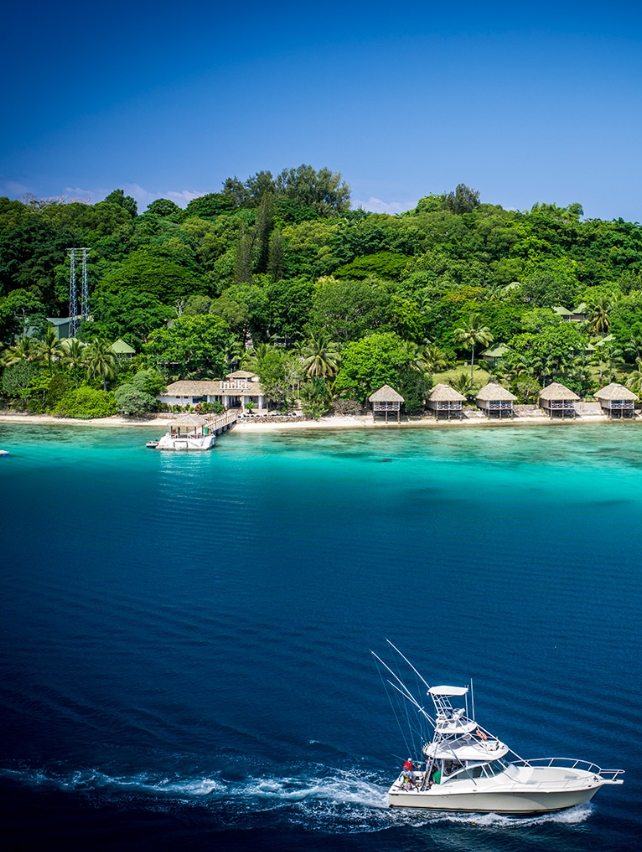
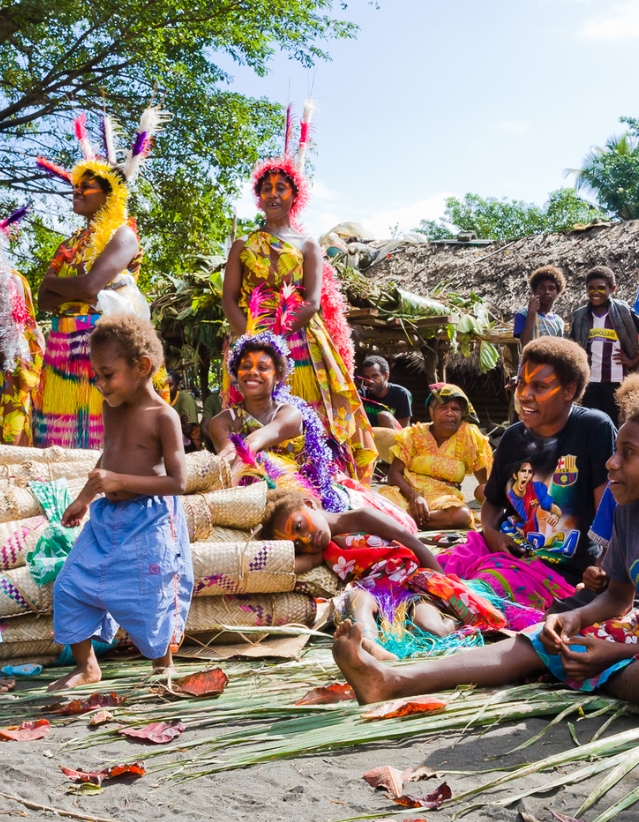
Nature and culture
Vanuatu is a peaceful, dynamic and culturally diverse country, and its citizens greet foreign visitors with pride and warm hospitality.
Vanuatu is located within the famous Pacific Ring of Fire. The archipelago’s landscapes are mostly of volcanic origin, with a powerful volcano at the centre, more or less covered by evergreen rainforests and framed by a narrow strip of fertile coastal plains. Overall, the archipelago has around 60 volcanoes, 10 of them active.
The archipelago’s flora is composed of many endemic plants, and its forests have such valuable types of wood as Agathis australis (commonly known as kauri), monkey puzzle tree and sandalwood.
Vanuatu’s flora is very diverse and is classified into several varieties depending on factors such as the type of soil and the altitude above sea level. On the plains, one would find agricultural crops, while the hills and mountains are covered by rainforests.
The islands’ fauna is relatively sparse, with few mammals – only 4 species of flying foxes and 8 species of bats. In addition to the mammals, Vanuatu is inhabited by snakes, lizards, geckos and crocodiles, as well as over 120 species of birds.
Vanuatu’s territorial waters are abundant with fish, and are also the habitat of rock lobsters, crabs and sea turtles. Some species of fish contain harmful toxins in their flesh, making it a wise move to always consult the locals on whether certain products are safe.
Efate Island is the most popular choice for tourists. The capital boasts the impressive Vanuatu Cultural Centre with its archaeological, ethnographic and art collections. Visitors can see the extinct volcano on the island of Nguna or the lush rainforests, rare birds and butterflies on Emao Island. Erromango Island is Vanuatu’s prime destination for hiking and trekking. The island is renowned for its abundant lush greenery and sandalwood trees. Tanna Island’s claim to fame is the constantly active volcano Mount
Yasur, the largest in the Republic.
Vanuatu’s contemporary culture is a kaleidoscope of traditions and a cornucopia of tribes and language groups. Previously separated by the sea or impassable mountains, various island ethnicities had spent thousands of years in almost complete isolation, which enabled them to preserve their cultural identities and languages even after the Europeans’ arrival. Some of the archipelago’s islands boast truly unique ancient rites and customs.
Traditional music and dance, very closely intertwined, play an important role in the lives of ni-Vanuatu. The musical instrument of choice is the tamtam, the local version of the slit drum or gong. Each ceremony is usually accompanied by live music. In the 1990s, Vanuatu saw the emergence of a number of bands, and zouk music and reggaeton became the most popular musical genres. Every year since 1996, the islands host the Fest’Napuan, a 6-day festival of contemporary music, involving a range of visiting acts from other Oceanian states.
Vanuatu’s culinary traditions are quite typical of the region – local Melanesian cuisine, abundant with fresh fish and seafood, meets significant colonial French and British influences, and this fusion results in some rather familiar European dishes interpreted in previously unseen ways and infused with local character.
Company
Investment programmes
© 2021 All rights reserved.